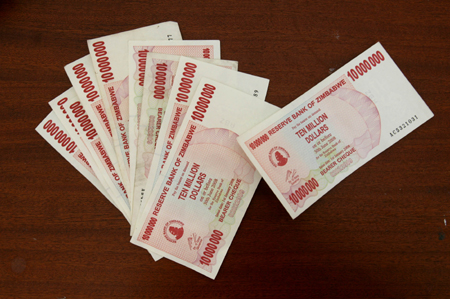Zimbabwean central bank unveils 25m, 50m-Zimbabwean-dollar notes
(Xinhua)
Updated: 2008-04-04 21:47
Updated: 2008-04-04 21:47
HARARE - The Reserve Bank of Zimbabwe (RBZ) introduced Friday two new bearer cheques with denominations of 25 million Zimbabwean dollars and 50 million Zimbabwean dollars, according to a notice published by the bank on The Herald newspaper.
The cash withdrawal limit for both individuals and corporates has been doubled to 1 billion Zimbabwean dollars, the newspaper reported.
The new notes are expected to ease the volume of notes needed when transacting. The highest denomination was 10 million Zimbabwe dollars, but its effectiveness had since been compromised by rising inflation.
This is the third time since December that the central bank has introduced higher denomination in response to rising inflation, which has surpassed 100,000 percent.
The RBZ introduced 750,000, 500,000 and 250,000 Zimbabwean dollars bearer cheques in December, and 10 million dollars bearer cheque in January.
RBZ public relations officials said Thursday that the introduction of the new bearer cheques was in response to submissions by tobacco and cotton growers whose selling seasons are impending, which is a period when large amounts of cash exchange hands.
The tobacco auction floors are expected to open on April 22 while cotton will start selling next week.
The Zimbabwean dollar is officially traded at US$ 1 to 30,000 Zimbabwean dollars, but to 40 million Zimbabwean dollars on black market.
Zimbabwe's economy has kept declining since the West imposed economic sanctions in 2000, after President Robert Mugabe-led government began to undertake a massive land reform program, under which the government acquired land from white farmers for redistribution to landless blacks.
The Zimbabwean government said that access to land had in the past been based upon a colonial land tenure system whereby less than 5 percent of the country's population, mainly whites, owned 80 percent of the productive land.
|
||
|
||
|
|
|
|


